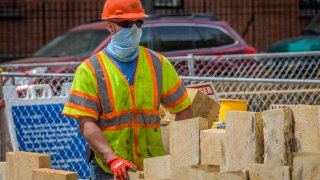
California workforce regulators will aim for a mid-June easing of workplace mask and social distancing requirements to conform with a broader state order, postponing a vote on whether to revise coronavirus safety rules for employees.
Cal/OSHA's staff said it would aim “to make possible a targeted effective date of June 15, 2021,” instead of proceeding with a proposal that would have made businesses wait until July 31 to ease some pandemic restrictions.
The same regulations also would impose new requirements that dozens of business groups called too onerous during a hearing Thursday by the California Occupational Safety and Health Standards Board.
Having two conflicting enforcement dates would be “a huge source of confusion and problems,” California Chamber of Commerce policy advocate Rob Moutrie told the board.
Get Southern California news, weather forecasts and entertainment stories to your inbox. Sign up for NBC LA newsletters.
The board delayed voting on the new rules after staff said they wanted to reconsider them based on last week's U.S. Centers for Disease Control and Prevention guidance that fully vaccinated people can now skip face coverings and distancing in virtually all situations.
California health officials said this week they will keep the state’s rules requiring indoor masking and distancing until the state more broadly lifts its pandemic restrictions on June 15, a date also endorsed by Gov. Gavin Newsom.
But Cal/OSHA board members said they are inclined to temporarily retain revised workplace safety rules perhaps past July 31, over the objections of some business groups. They set a June 3 hearing to consider revised rules.
California
News from across California
“I think we need to continue to have some COVID requirements in place — the crisis isn’t over. But I think we need to recognize that it’s been mitigated to some extent,” board member Chris Laszcz-Davis said.
Cal/OSHA regulations apply in almost every workplace in California, including those in state and local governments. Its emergency temporary standards related to the pandemic apply to all employees except those working from home or where there is a single employee who does not have contact with other people.
California has made a remarkably fast transition from being an epicenter for the virus at the start of the year to a record low infection rate of less than 1% and an economy with all sectors now reopened, albeit with restrictions. More than half the state’s population of nearly 40 million has received at least one vaccine dose.
Employers told the board that the improvement makes the rules less necessary, while worker advocates said having half the population unvaccinated means precautions are still needed.
Proposed additional employer mandates intended to make up for some relaxed regulations would “create new unnecessary burdens and requirements,” said Helen Cleary, director of the Phylmar Regulatory Roundtable, a coalition of large businesses.
Business groups are particularly upset with a proposal requiring that employers provide masks for voluntary use starting July 31.
That potentially means regularly providing N95 face masks to 2 million workers, CalChamber's Moutrie said, assuming 20% of the state’s 20 million workers can’t or won’t be vaccinated and half of those work indoors. The rules also would require employers to provide free coronavirus testing during work hours to unvaccinated employees with COVID-19 symptoms.
Standards board chairman David Thomas later said he was inclined to permit less effective face coverings like his own blue surgical-style mask. But others said that easing some safeguards makes it more important that workers have the type of mask that provides the most protection.
Thomas, like other board members, said regulators must be cautious in lifting safety regulations for fear of triggering a new surge.
“Hopefully we’re getting to a place where we can open things up,” Thomas said, but “we’ve seen this before and we just don’t want to get, for lack of a better word, we don’t want to get stupid.”
Requiring employers to provide masks and make other provisions like installing partitions and air filters “adds more burdensome obligations to employers just as the federal government is loosening restrictions and California’s Governor appears to believe California is on track to open in June,” more than 40 groups said in a comment letter. They include organizations representing California cities and counties, retailers and restaurateurs.
More than 40 agricultural organizations separately objected that “the state cannot reopen if businesses are still required to comply with strict and unnecessary COVID-19 restrictions.”
But labor and other advocates urged caution in lifting workplace pandemic safety rules.
“Every day we hear from workers about their fear of going to work, getting the virus and bringing it home to their families,” said Eddie Sanchez of the Southern California Coalition for Occupational Safety and Health, which advocates particularly for workers who are immigrants or people of color. ”We know from experience now that employers will not do what’s right or what’s safe on their own.”
Maggie Robbins, occupational health specialist with Worksafe Inc., an Oakland-based worker advocacy group, said Cal/OSHA shouldn't ease workplace rules just because the state is relaxing requirements in social settings, a development she said could “lead to basically open season in the workplace for all controls to be relaxed.”
The board's staff is now reconsidering rules that would require workers to wait until July 31 before they can stop wearing masks indoors and distancing, unless everyone in the same room is fully vaccinated and not showing coronavirus symptoms.
“Exemptions for fully vaccinated employees will not work if 100% of the workforce must be vaccinated to benefit,” Cleary said.
But Cal/OSHA's staff warned that some regulations are needed even as conditions improved. “Even if the state is able to reopen fully in June, COVID-19 is likely to remain a significant workplace hazard for months to come, if not longer,” they advised the board.



